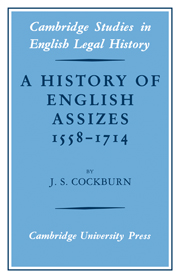Book contents
- Frontmatter
- Contents
- Dedication
- Preface
- List of Abbreviations
- INTRODUCTION
- Part One THE STREAMS OF PARADISE
- Part Two ASSIZES AND GAOL DELIVERY
- 4 Preliminary proceedings
- 5 The clerk of assize and his staff
- 6 Criminal proceedings
- 7 Nisi prius
- Part Three THE PLANETS OF THE KINGDOM
- APPENDICES
- Bibliography
- Index
4 - Preliminary proceedings
Published online by Cambridge University Press: 07 October 2011
- Frontmatter
- Contents
- Dedication
- Preface
- List of Abbreviations
- INTRODUCTION
- Part One THE STREAMS OF PARADISE
- Part Two ASSIZES AND GAOL DELIVERY
- 4 Preliminary proceedings
- 5 The clerk of assize and his staff
- 6 Criminal proceedings
- 7 Nisi prius
- Part Three THE PLANETS OF THE KINGDOM
- APPENDICES
- Bibliography
- Index
Summary
At the border of the first county on each circuit the judges were met by trumpeters and the sheriff's bailiff and, several miles from the assize town, by the sheriff himself, other local officers, and representatives of the county gentry. The ensuing cavalcade, throughout this period and, indeed, well into the nineteenth century, was one of some magnificence, attended by pike- and liverymen specially clothed for the occasion. Welcomed into town with bells, music, and occasionally, a Latin oration, the judges went first to their lodgings. There they received leading members of the local gentry who probably reported briefly on the state of the county. Thus forewarned, the judges, now robed and again attended by the sheriff and his men, passed to the church where the local minister read prayers and the sheriff's chaplain delivered a sermon.
Most assize sermons were distinguished only by their length, and some judges clearly found church attendance irksome. But since many assize sermons were printed and thus reached a wider audience their political significance could not be ignored. Sheriffs were encouraged to consider the political leanings of clergy they selected as assize chaplains, and in the seventeenth century the Privy Council itself took notice of appointments. Writing to the Archbishop of York in 1632, the Council criticized recent chaplains as being either unfriendly to the government or lacking in ‘sufficiency or experience for those places and auditories (being assemblies of the principal persons of each county), and have given cause for scandal and offence which is of dangerous consequence, and might be easily prevented if election were made of discreet and able men’.
- Type
- Chapter
- Information
- A History of English Assizes 1558–1714 , pp. 65 - 69Publisher: Cambridge University PressPrint publication year: 1972

